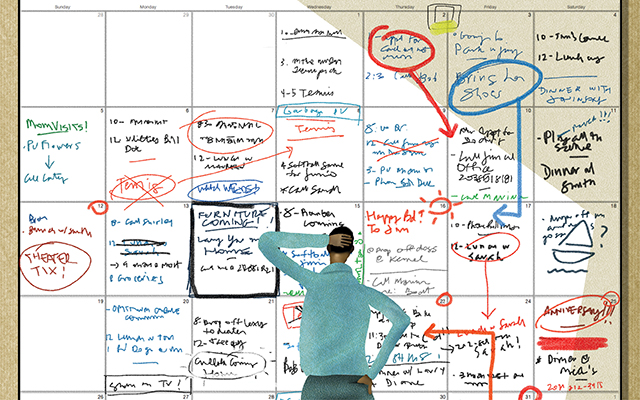Remember those resolutions you set in January? Well, I’ve got some news for you: That was five months ago. Almost half the year has gone by. So how are you coming with those goals?
If you haven’t made all the progress you’d like, don’t beat yourself up about it. But do take it as a sign that you might need a more focused approach to accomplishing your key objectives.
In my March column (“A Brilliant Scheme”), I shared a high-level overview of my five-step process for getting things done. Here I’ll zoom in a little tighter on a two-part formula I’ve found helpful in moving ahead whenever things seem stuck — or more slow-going than I’d like.
The first element involves the rapid-fire setting and frequent measuring of very small, incremental goals.
Basically, once you have a clear idea of what you want to accomplish, you start moving in baby steps, and assiduously documenting your progress. We’re talking about task-level items here, the kind you can accomplish in a single day, hour — or even a few minutes. This allows you to create small blocks of success that can be systematically measured, ideally in the smallest applicable unit.
For example, if your initial fitness goal is to fit in three hours of exercise a week, you might break those three hours down into 10-minute segments, set up a quick chart that lets you check them off as you go, and then immediately take a jog around the block so you can check off the first segment right away.
On that first day, those 10 minutes may be the only exercise you manage to squeeze in. Even so, if you take the step of documenting them, you still win on a number of fronts. You’ll immediately see that you’re not yet on track with your goal, and you’ll have a clear, visual sense of precisely how much more you’re going to need to do to get there. But you’ll also immediately see that you’re already doing something. You’re making progress, and that’s energizing.
Seeing this sort of objective evidence of momentum (or lack thereof) is clarifying. It connects you with your ideal outcome in a concrete, visceral way that just “trying to exercise a little more often” will not. And it lets you know if and when you’re going to need to make adjustments to your plan to achieve your aim.
What I’ve learned in business, and also in my own life, is that we tend to succeed at the things we measure daily — and we do comparatively less well at the things we measure weekly, monthly, annually or not at all.
In other words, as the frequency of measurement in any given effort diminishes, so do the chances of success — and this is particularly true for things we’re not yet in the habit of doing (or measuring) consistently.
The second important element of this formula involves clarifying, and potentially shifting, your whole problem-solving paradigm.
Some people look at problems and get revved up, because they see problems as challenges — temporary, situational challenges to be overcome.
Every time people like this are confronted with a hurdle, they do their darndest to rise to the occasion. On some level, it inspires them and gives them a reason to excel. It helps them test and sharpen their skills.
In such individuals’ minds, almost any problem can be seen as an opportunity to do their best, bring their best, or make their best better.
There are other people, though, for whom problems are just problems. And for them, even the smallest complications or hiccups tend to seem like insurmountable trials and tribulations.
Rather than asking “How can I do this?” these people seem to be constantly arguing for “why I can’t do this” — and complaining to anyone who will listen about how impossible everything is.
People with inclinations in this direction would do well to take a lesson from the individuals in the first group. Because, in truth, every problem has a solution, and most problems have multiple solutions. The folks who are best at making progress toward their goals (by going over, under, around or through the obstacle at hand) are the ones willing to develop their instincts through hard-won experience. And they are often the very same ones who enjoy measuring their progress, step by step.
So if you’ve got a goal or challenge on your hands, celebrate! You’ve got a chance to do something worthwhile, and to do it well. And keep in mind, if you make too good a case for why you “can’t” solve problems, before too long, you’ll probably be right. As a result, you may not be given many worthy or interesting problems to solve — which, let’s face it, means you aren’t likely to wind up with as many golden opportunities as you deserve, either.




This Post Has 0 Comments